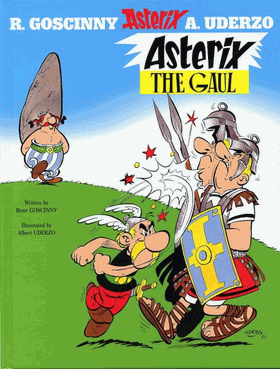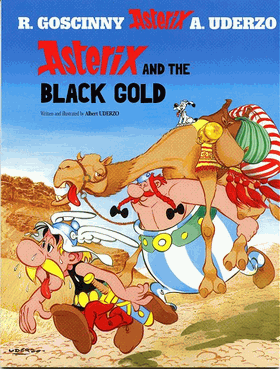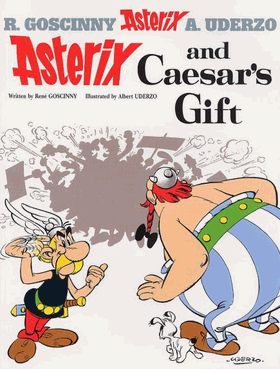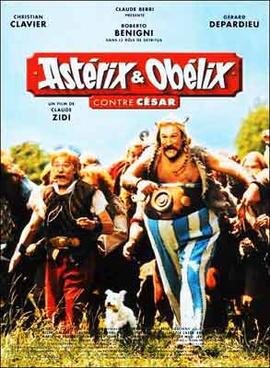
Asterix is a French comic album series about a Gaulish village which, thanks to a magic potion that enhances strength, resists the forces of Julius Caesar's Roman Republic Army in a nonhistorical telling of the time after the Gallic Wars. Many adventures take the titular hero Asterix and his friend Obelix to Rome and beyond.

Asterix and the Great Divide is the twenty-fifth volume of the Asterix comic book series. First published in French in 1980, it was translated into English in 1981. It is the first Asterix adventure to be written by illustrator Albert Uderzo, following the death of Asterix co-creator and writer René Goscinny in 1977.

Asterix the Gaul is a French comic story, written by René Goscinny and illustrated by Albert Uderzo. First published by Dargaud as a serial for Pilote magazine in October 1959, it was later released as a comic album in 1961. The story focuses on a Gaul named Asterix, whose village resists Roman rule, as he attempts to rescue his village's druid from a Roman garrison when its commander seeks to secure the secret of the village's superhuman strength.

Asterix and the Big Fight is a French comic book story, written by René Goscinny and illustrated by Albert Uderzo. It is the seventh story in the Asterix comic book series, and was originally published by Dargaud as a serial for Pilote magazine in 1964, before later being released as a comic album in 1966

Asterix and the Goths is a French comic story, written by René Goscinny and illustrated by Albert Uderzo. It is the third story in the Asterix comic book series, and was originally published by Dargaud as a serial for Pilote magazine in 1962, before being later released as a comic album in 1963.

Asterix and the Chieftain's Shield is the eleventh volume in the Asterix comic book series, written by René Goscinny and drawn by Albert Uderzo. It was originally published as a serial in Pilote issues 399–421 in 1967.

Asterix and the Black Gold is the twenty-sixth volume of Asterix comic book series, originally published in 1981. It is the second book to be both written and drawn by Albert Uderzo.

Asterix the Gladiator is a French comic story, written by René Goscinny and illustrated by Albert Uderzo. It is the fourth story in the Asterix comic book series, and was originally published by Dargaud as a serial for Pilote magazine in 1962, before later being released as a comic album in 1964.
Asterix and Son is the twenty-seventh volume of the Asterix comic book series, created by author René Goscinny and illustrator Albert Uderzo. It was the third Asterix album to be written and illustrated by Uderzo.

Asterix in Belgium is the twenty-fourth volume of the Asterix comic book series, by René Goscinny (story) and Albert Uderzo (illustrations).

Obelix and Co. is the twenty-third volume of the Asterix comic book series, by René Goscinny (stories) and Albert Uderzo (illustrations). The book's main focus is on the attempts by the Gaul-occupying Romans to corrupt the one remaining village that still holds out against them by instilling capitalism. It is also the penultimate volume written by Goscinny before his death in 1977; his final volume, Asterix in Belgium, was released after his death in 1979.

Asterix and Caesar's Gift is the twenty-first volume of the Asterix comic book series, by René Goscinny (stories) and Albert Uderzo (illustrations). It was the first Asterix adventure that was not published in serial form in Pilote magazine prior to its publication as a book.

Asterix and the Roman Agent is the fifteenth volume of the Asterix comic book series, by René Goscinny (stories) and Albert Uderzo (illustrations). It first appeared as a serial in Pilote magazine issues 531–552 in 1970 and was translated into English in 1972.

Asterix and Obelix All at Sea is the thirtieth volume of the Asterix comic book series, by Albert Uderzo. The album was dedicated to Uderzo's grandchild, as well as to the American actor Kirk Douglas.

Asterix the Gaul is a 1967 Belgian/French animated film, the first in a franchise, based on the comic book of the same name, which was the first book in the highly popular comic series Asterix by René Goscinny and Albert Uderzo. The film closely follows the book's plot.

Asterix in Britain is a French-Danish animated film, directed by Pino van Lamsweerde, written by Pierre Tchernia, produced by Dargaud Films and Les Productions René Goscinny, and released in December 1986. The film is the fifth adaptation of a story from the Asterix comic series, and is based upon the plot from the graphic novel of the same name by René Goscinny and Albert Uderzo. The film's plot focuses on Asterix and Obelix transporting a barrel of Magic Potion to a rebel village of Britons, as they attempt to hold out against the Romans. The original French release starred Roger Carel and Pierre Tornade in the lead roles, while the English release starred Jack Beaber and Billy Kearns.

Asterix and Obelix vs. Caesar is a 1999 French-Italian-German comedy fantasy adventure film directed by Claude Zidi, the first installment in the Asterix film series based on Goscinny and Uderzo's Astérix comics. The film combines plots of several Astérix stories, mostly Asterix the Gaul, Asterix and the Soothsayer, Asterix and the Goths, Asterix the Legionary and Asterix the Gladiator but jokes and references from many other albums abound, including a humorous exchange between Caesar and Brutus taken from Asterix and Cleopatra, and the villain Lucius Detritus is based on Tullius Detritus, the main antagonist of Asterix and the Roman Agent.

Asterix and Obelix's Birthday: The Golden Book is the thirty-fourth album of the Asterix comic book series, designed and written by Albert Uderzo. The book also includes Asterix stories which were created jointly with René Goscinny. The album, which celebrates the 50th anniversary of the creation of the series, was released on 22 October 2009.

Asterix: The Secret of the Magic Potion is a 2018 French animated adventure family comedy film co-directed by Alexandre Astier and Louis Clichy. A sequel to 2014's Asterix: The Mansions of the Gods, the screenplay by Astier is based on the Asterix comic book characters created by René Goscinny and Albert Uderzo. This is the first Asterix production not to feature Roger Carel as the voice of Asterix, due to his retirement and later death. Asterix is instead voiced by Christian Clavier, who previously played the character in Asterix and Obelix vs. Caesar and Asterix & Obelix: Mission Cleopatra.

















